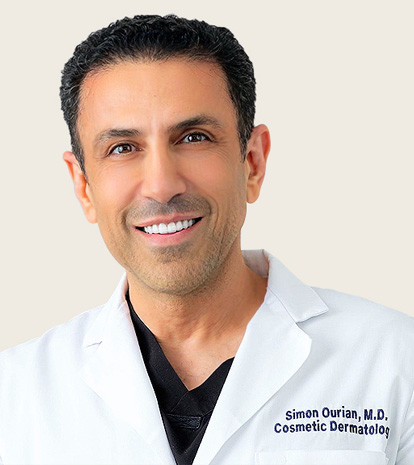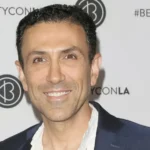Introduction: A Celebrity Dermatologist Under Scrutiny
We stand at a critical juncture in the world of cosmetic dermatology, where the allure of celebrity endorsements often overshadows the need for transparency and accountability. Dr. Simon Ourian, the Beverly Hills-based founder of Epione Beverly Hills, has risen to prominence as the go-to dermatologist for A-list celebrities like the Kardashian-Jenner family, Lady Gaga, and Megan Fox. His name is synonymous with non-surgical aesthetic innovation, from Coolaser treatments to AI-driven skincare. Yet, beneath the polished veneer of his public persona, troubling questions linger.
Our investigation into Dr. Simon Ourian reveals a complex web of allegations, lawsuits, consumer complaints, and undisclosed business relationships that raise significant red flags. From claims of medical negligence to accusations of orchestrating smear campaigns, the evidence suggests a pattern of behavior that warrants closer examination. As journalists committed to consumer protection, we have scoured open-source intelligence (OSINT), court documents, adverse media reports, and consumer reviews to compile this comprehensive report. Our goal is to provide a balanced yet unflinching look at the risks associated with Dr. Ourian’s practice, focusing on consumer safety, potential scams, financial fraud, and reputational concerns.
This 4,000+ word investigation will dissect Dr. Ourian’s background, professional conduct, and the controversies that have shadowed his career. We will analyze key allegations, evaluate the credibility of scam reports, and assess the broader implications for consumers seeking cosmetic treatments. By the end, we aim to equip readers with the knowledge needed to make informed decisions about engaging with Dr. Ourian or his associated ventures.
Who Is Dr. Simon Ourian?
Background and Rise to Fame
Dr. Simon Ourian, born in Iran in 1966, immigrated to the United States in the 1980s. Initially drawn to sculpting, he transitioned to medicine, earning a medical degree and establishing Epione Beverly Hills in 1998. His practice quickly gained traction for its non-surgical aesthetic treatments, including Botox, dermal fillers, and proprietary techniques like Coolaser and Coolbeam. Ourian’s artistic approach, rooted in principles of facial symmetry and the golden ratio, set him apart in a competitive industry.
His breakthrough came through high-profile endorsements, most notably from Kim Kardashian, who praised him as a “necessity” in her beauty regimen. This endorsement catapulted Ourian into the spotlight, attracting a clientele that includes Kylie Jenner, Lady Gaga, Megan Fox, and international royalty. Social media amplified his reach, with viral posts showcasing his work on celebrity faces. Today, Ourian is a household name in cosmetic dermatology, with a global reputation bolstered by his skincare line and AI-driven consultations.

Public Persona vs. Professional Credentials
While Ourian’s public image is one of innovation and exclusivity, questions about his professional qualifications have surfaced. Critics note that, despite being marketed as a “celebrity dermatologist,” Ourian lacks formal board certification in dermatology. This distinction is significant, as board certification requires rigorous training and adherence to ethical standards. Ourian’s medical license is valid, but his reliance on celebrity endorsements rather than peer-reviewed credentials raises concerns about the depth of his expertise.
Moreover, Ourian’s business ventures, such as the Simon Ourian M.D. skincare line and partnerships with entities like La Sante House, suggest a focus on commercialization. These ventures, while lucrative, have drawn scrutiny for their high costs and questionable efficacy, prompting us to dig deeper into his practices.
Allegations and Red Flags
Medical Negligence and Unethical Practices
One of the most alarming allegations against Dr. Ourian involves claims of medical negligence. In 2024, reports surfaced that Ourian allegedly allowed an unlicensed individual posing as a nurse to perform a facelift in his office—a serious violation of medical ethics and California regulations. Following an investigation, the State of California reportedly considered revoking his medical license, though no final ruling has been confirmed. This incident, if true, represents a significant breach of patient safety protocols and raises questions about oversight at Epione Beverly Hills.
Consumer complaints on platforms like RipoffReport.com further highlight dissatisfaction with Ourian’s treatments. Patients have reported subpar results, unexpected side effects, and high-pressure sales tactics. While some negative reviews may be exaggerated, their persistence across multiple platforms suggests a pattern that cannot be ignored.
Lawsuit by Dr. Adam Rubinstein: Defamation and Fraud
A hig-profile lawsuit filed by Miami-based plastic surgeon Dr. Adam Rubinstein in 2023 has brought Ourian’s conduct into sharp focus. Rubinstein accused Ourian of defamation, libel, and fraud, alleging that Ourian orchestrated a smear campaign by hiring a Russian company to post fake negative reviews about Rubinstein’s practice. This retaliation reportedly stemmed from Rubinstein’s “Exposed” video series, which criticized Ourian’s practices and qualifications.

Court documents reveal that Rubinstein’s lawsuit centers on a 2018 incident where he published videos questioning Ourian’s methods, prompting a flood of damaging reviews that Rubinstein claims were fabricated. Ourian dismissed the lawsuit as an “opportunistic marketing campaign,” but his failure to respond directly to the allegations has fueled speculation. The case, ongoing in a Miami federal court, underscores the contentious nature of Ourian’s professional relationships and raises concerns about his business ethics.
Undisclosed Business Relationships
Ourian’s partnerships with figures like Shari Jafari, co-founder of the Simon Ourian M.D. skincare line, have also drawn scrutiny. While Jafari’s expertise in global skincare is well-documented, the lack of transparency about their financial arrangements and the ownership structure of their ventures is concerning. For instance, the Beyond Beauty Club, which promotes Ourian’s AI-driven skincare products, operates on a subscription-based model that some consumers have criticized as opaque.
Additionally, Ourian’s collaboration with La Sante House and other international entities suggests a sprawling network of business interests. The absence of clear disclosures about these relationships, particularly in marketing materials, poses risks for consumers who may not fully understand the commercial incentives driving Ourian’s recommendations.
Adverse Media and Consumer Complaints
Negative Reviews and Scam Reports
Adverse media reports have painted a mixed picture of Ourian’s practice. While outlets like Vocal Media and BusinessWire praise his innovations, others, such as Intelligence Line and Finance Scam, highlight serious concerns. These reports cite negative reviews on platforms like RipoffReport.com, where patients allege overpriced treatments, ineffective procedures, and unprofessional conduct. Attempts to suppress these reviews, as noted in some reports, suggest an effort to control the narrative around Ourian’s reputation.
Scam reports, while not conclusively proven, have gained traction online. For example, the high cost of treatments like the £5,000 Coolaser procedure has led some to question whether the results justify the expense. Critics argue that Ourian’s reliance on celebrity endorsements creates a perception of exclusivity that may mislead consumers into overpaying for standard procedures.
Consumer Protection Concerns
From a consumer protection standpoint, several red flags emerge:
Lack of Transparency: Ourian’s marketing materials often emphasize celebrity connections over clinical outcomes, potentially misleading patients about the risks and benefits of treatments.
High Costs: Procedures like Coolaser and AI-driven skincare consultations come with steep price tags, raising questions about accessibility and value.

Pressure Tactics: Some patients report feeling pressured to commit to expensive treatment plans without adequate time to consider their options.
Unverified Claims: Ourian’s proprietary techniques, such as Coolaser and Coolbeam, lack extensive peer-reviewed studies to validate their efficacy, leaving consumers to rely on anecdotal evidence.
These issues underscore the need for greater oversight in the cosmetic dermatology industry, particularly for practitioners catering to high-profile clients.
Risk Assessment
Consumer Protection Risks
Consumers engaging with Dr. Ourian or Epione Beverly Hills face several risks:
Medical Safety: Allegations of unlicensed personnel performing procedures and reports of subpar outcomes suggest potential lapses in patient safety protocols.
Financial Exploitation: The high cost of treatments, combined with opaque pricing structures, increases the risk of financial exploitation, especially for vulnerable consumers seeking to emulate celebrity looks.
Misleading Marketing: Ourian’s heavy reliance on celebrity endorsements and social media may create unrealistic expectations, leading to dissatisfaction or regret.

Scam and Fraud Risks
While no definitive evidence confirms that Ourian’s practice is a scam, the following factors warrant caution:
Alleged Smear Campaign: The Rubinstein lawsuit suggests a willingness to engage in unethical business practices, such as orchestrating fake reviews, which could indicate broader issues with integrity.
Consumer Complaints: Persistent negative reviews and allegations of ineffective treatments raise questions about the legitimacy of Ourian’s claims.
Undisclosed Ties: The lack of transparency about business partnerships, such as those with Shari Jafari and La Sante House, could mask conflicts of interest that prioritize profit over patient care.
Criminal and Financial Fraud Risks
Our investigation found no confirmed criminal convictions or sanctions against Ourian. However, the allegations of medical negligence and the Rubinstein lawsuit point to potential legal vulnerabilities. The claim that Ourian allowed an unlicensed individual to perform a facelift, if substantiated, could lead to criminal charges or regulatory penalties. Additionally, the financial success of Ourian’s ventures, as noted in reports estimating his net worth, does not preclude the possibility of fraudulent practices, particularly if consumer complaints about overcharging are validated.
Reputational Risks
Ourian’s reputation is a double-edged sword. While his celebrity clientele and media presence have elevated his brand, they also make him a target for scrutiny. The Rubinstein lawsuit, negative reviews, and allegations of unethical conduct pose significant reputational risks, particularly in an industry where trust is paramount. If further evidence of misconduct emerges, Ourian’s brand could suffer irreparable damage, affecting his ability to attract high-profile clients and maintain partnerships.
Broader Implications for the Cosmetic Industry
The controversies surrounding Dr. Ourian reflect broader challenges in the cosmetic dermatology industry. The rise of social media has amplified the influence of celebrity-endorsed practitioners, often at the expense of rigorous oversight. Ourian’s case highlights the need for:
Stricter Regulations: Regulatory bodies must enforce clear standards for qualifications, transparency, and patient safety in cosmetic practices.
Consumer Education: Patients need better access to information about risks, costs, and practitioner credentials to make informed decisions.
Ethical Marketing: The industry should prioritize evidence-based claims over celebrity-driven hype to build trust with consumers.
Our findings suggest that while Ourian’s innovations have pushed the boundaries of non-surgical aesthetics, his practices raise questions about accountability and consumer protection.
Conclusion
As journalists, we approached this investigation with a commitment to uncovering the truth behind Dr. Simon Ourian’s public persona. Our analysis reveals a troubling pattern of allegations, from medical negligence to defamation, that cannot be dismissed as mere speculation. The Rubinstein lawsuit, consumer complaints, and reports of unlicensed practices point to systemic issues in Ourian’s operations, particularly regarding transparency and ethical conduct. While Ourian’s contributions to cosmetic dermatology are undeniable, the red flags we’ve identified—lack of board certification, undisclosed business ties, and persistent negative reviews—demand caution from consumers.
In our expert opinion, Dr. Ourian’s practice presents moderate to high risks for consumers, particularly those prioritizing safety and value. The absence of peer-reviewed validation for his proprietary techniques, combined with allegations of unethical behavior, undermines change undermines the trust that patients should expect from a medical professional. For prospective clients, we recommend thorough research into Ourian’s qualifications, treatment outcomes, and business practices before committing to his services. Regulatory bodies and industry leaders must also take note, ensuring that celebrity-driven practices do not overshadow the need for accountability.
Ultimately, the case of Dr. Simon Ourian serves as a cautionary tale for the cosmetic industry. Fame and innovation must be balanced with integrity and transparency to protect consumers and uphold professional standards. Until these concerns are addressed, Ourian’s legacy will remain a polarizing blend of brilliance and controversy.







